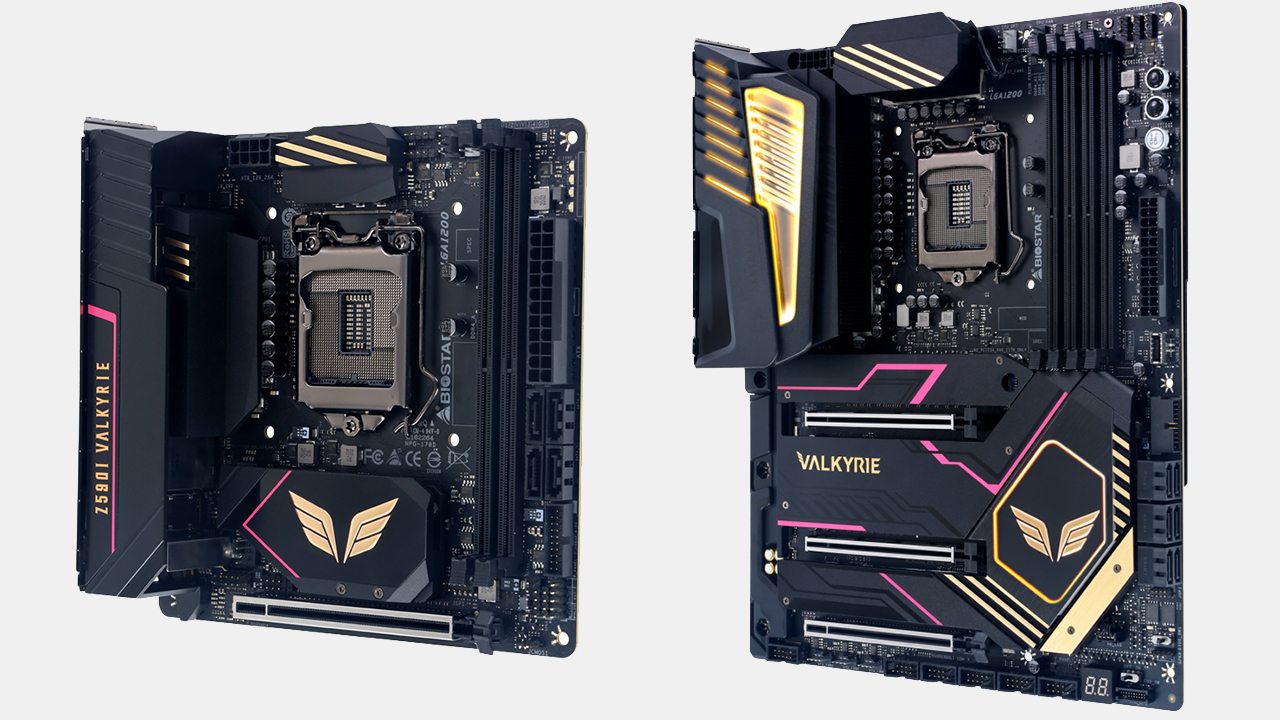Biostar has introduced two motherboards based on Intel’s Z590 platform that belong to its all-new Valkyrie range. The new premium family includes two new boards, the ATX Z590 Valkyrie and a Mini-ITX Z590i Valkyrie, models which are expected to address the needs of demanding gamers and enthusiasts offering them advanced features that they come to expect from high-end mainboards.
For many years Biostar focused on entry-level, midrange, and specialized motherboards leaving lucrative higher-end platforms for gamers and enthusiasts to larger players. Several years ago, the company unveiled its Racing-series platforms designed for gamers, and while they were clearly not entry-level or niche products, they still did not compete directly with enthusiast-grade hardware. With its Valkyrie, Biostar wants to finally offer motherboards designed for enthusiasts who demand advanced overclocking capabilities along with a rich set of features.
The initial Biostar Valkyrie family includes two models that support Intel’s processors in the LGA1200 packaging (Comet Lake-S, Rocket Lake-S): the Z590 Valkyrie and the Z590I Valkyrie. To maximize overclocking potential, both motherboards use 10-layer printed circuit boards (PCBs), Dr. MOS-based digital voltage regulating modules (VRMs) featuring solid-state inductors and capacitors as well as active cooling, and advanced memory circuitry. Due to different form-factors, the Mini-ITX Z590I Valkyrie uses a 10-phase VRM, whereas the ATX Z590 Valkyrie comes with a 22-phase VRM.
Additional features include a sophisticated chipset cooling, iron-enforced PCIe x16 slots, more robust power connectors, and protected I/O ports.
The smaller Biostar Z590I Valkyrie features two DDR4 memory slots that support up to 64GB of DDR4-5000 memory, one PCIe 4.0 x16 slot for graphics cards, four SATA connectors as well as one M.2-2280 slot for a PCIe 4.0 x4 or SATA SSD.
The bigger Biostar Z590 Valkyrie carries four DDR4 memory slots to install up to 128GB of DDR4-5000 memory, three PCIe x16 slots for graphics cards (two PCIe 4.0 x16/x8, one PCIe 3.0 x16 working in x4 mode), six SATA connectors, and three M.2-2280 for SATA or PCIe drives.
Being high-end offerings, Biostar’s Z590I Valkyrie and Z590 Valkyrie motherboards offer rather advanced set of input/output technologies that includes a 2.5GbE port, an M.2-2230 slot for an optional Wi-Fi 6 adapter, multiple USB 3.2 Gen 1 Type-A connectors, one USB 3.2 Gen 2×2 Type-C port, two display outputs (DisplayPort 1.4, HDMI 2.0), and a 7.1-channel audio subsystem with 3.5-mm and optical connectors.
Traditionally for enthusiast-grade motherboards, Biostar’s Z590I Valkyrie and Z590 Valkyrie feature connectors for RGB LED strips as well as comes with software to control these LEDs.
Biostar has been expanding its product lineups for some time now, so the introduction of higher-end motherboards is not exactly surprising. Nonetheless, Biostar’s decision to compete directly with advanced platforms from the Big Four makers may be an important milestone for the industry because ASUS, ASRock, Gigabyte, and MSI have been commanding the retail motherboard market for about a decade now after second-tier mainboard makers refocused to other products. Of course, only time will tell whether Biostar will be able to compete with its bigger rivals successfully, but at least the company decided to try.
Biostar yet has to disclose pricing of its Valkyrie-series motherboards, but it is safe to say that these platforms will be more expensive when compared to the company’s Racing family of products.
